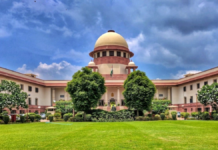
Key Points:
- Historic legislation enacted: The Waqf (Amendment) Act, 2025, came into force on April 8 after receiving approval from Parliament and President Droupadi Murmu.
- Reforms in Waqf property management: Key changes include digitization, enhanced transparency, and protection of women’s inheritance rights.
- Opposition backlash: Critics claim the Act undermines religious autonomy and violates constitutional rights, sparking petitions in the Supreme Court.
- Supreme Court hearing scheduled: Over ten petitions challenging the Act’s validity will be heard on April 16.
New Delhi: The Waqf (Amendment) Act, 2025, officially came into effect on April 8, marking a significant shift in the governance of Waqf properties across India. Passed by both houses of Parliament after intense debates and receiving Presidential assent on April 5, the Act aims to modernize Waqf administration while addressing longstanding concerns about transparency, efficiency, and social welfare. However, the legislation has sparked widespread controversy, with opposition parties and Muslim organizations challenging its constitutionality in court.
Key Features of the Waqf Amendment Act
The new law introduces several reforms to improve the management of Waqf properties:
- Digitization of records: State Waqf Boards are required to upload property details to a centralized portal for better accessibility and monitoring.
- Women’s inheritance rights: Ensures women receive their rightful share before properties are dedicated to Waqf, with special provisions for widows and divorced women.
- Dispute resolution mechanisms: Establishes time-bound Waqf Tribunals to address property disputes efficiently.
- Restrictions on dedication: Limits Waqf dedication to practicing Muslims while separating trusts from Waqf properties.
These measures aim to safeguard heritage sites, prevent encroachments, and empower marginalized communities within the Muslim population.
Opposition Criticism and Legal Challenges
The Act has faced strong opposition from political parties like Congress, DMK, AIMIM, and various religious groups. Critics argue that:
- The inclusion of non-Muslims in Waqf boards undermines religious autonomy.
- Centralized control over Waqf properties increases bureaucratic overreach.
- The removal of “Waqf by user” provisions jeopardizes historically significant properties without formal documentation.
Opposition leaders have labeled the law “anti-Muslim” and “unconstitutional,” citing violations of Articles 14 (equality), 25 (religious freedom), and 29 (cultural rights) of the Indian Constitution. Congress MP Khaleequr Rahman criticized the government for ignoring opposition recommendations during parliamentary discussions.
Supreme Court Intervention
Over ten petitions challenging the constitutionality of the Act have been filed in the Supreme Court by groups such as AIMPLB, Jamiat Ulama-e-Hind, and political leaders like Asaduddin Owaisi. The court has scheduled a hearing for April 16 to address these concerns.
In response, the central government has filed a caveat requesting that no orders be passed without hearing its arguments. Legal experts suggest that this case could set a precedent for balancing religious autonomy with administrative reforms.
Political Divide
The BJP-led NDA government has defended the Act as a “historic reform” aimed at benefiting marginalized Muslim communities through initiatives like UMEED (Unified Waqf Management Empowerment, Efficiency, and Development). Union Home Minister Amit Shah emphasized its focus on transparency and social welfare.
Meanwhile, opposition leaders like Mallikarjun Kharge have called for its withdrawal, arguing that it promotes communal division under the guise of reform.
Implications for Governance
The implementation of this legislation is expected to reshape how religious endowments are managed in India:
- Enhanced oversight may reduce mismanagement but could lead to increased disputes over property ownership.
- Provisions for women’s rights are seen as progressive but face criticism for diluting broader community autonomy.
- Digitization could streamline processes but may also expose sensitive data to misuse.
Looking Ahead
As the Supreme Court prepares to hear challenges against the Act, its fate hangs in balance. If deemed unconstitutional, it could deal a significant blow to the BJP government’s legislative agenda. Conversely, if upheld, it may pave the way for similar reforms in other religious institutions.
The Waqf Amendment Act represents a pivotal moment in India’s legislative history—one that seeks to balance modernization with tradition amidst intense political scrutiny.








































